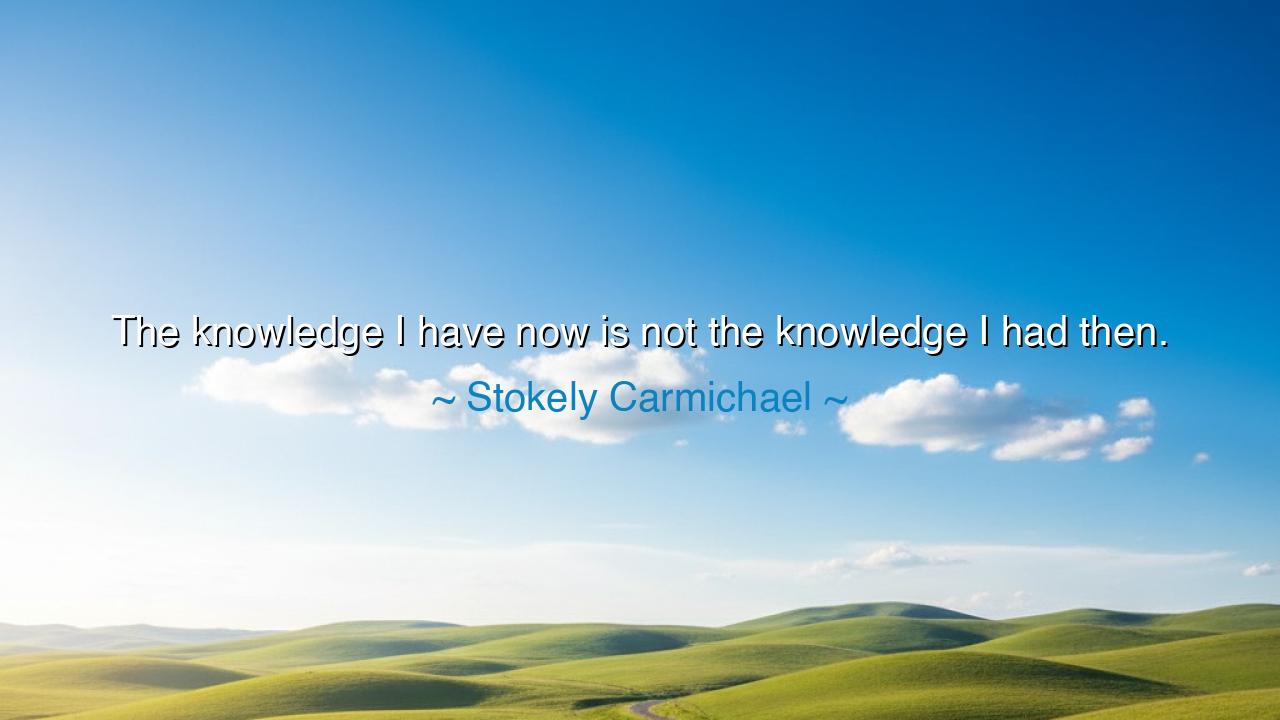
The knowledge I have now is not the knowledge I had then.






Hear the words of Stokely Carmichael, a warrior of justice and voice of the oppressed, who declared: “The knowledge I have now is not the knowledge I had then.” This is not merely a reflection on the past, but a revelation of the soul’s journey. For the path of life is not fixed; it bends and sharpens, and along its course the mind transforms. What we knew in our youth is not what we know in our maturity, and the truths of yesterday often crumble before the deeper truths of tomorrow. Such is the rhythm of growth: that knowledge is alive, ever-changing, and the wise are those who allow themselves to be remade by its fire.
In these words, Carmichael speaks of transformation. He was not the same man in every season of his struggle. At first, he believed in integration, walking hand in hand with the civil rights movement’s early vision of unity. But with time, with scars carved by oppression and betrayal, his knowledge deepened. He came to cry for Black Power, a call not of hatred but of self-determination, dignity, and the strength of identity. Thus he shows us that knowledge is not stagnant; it is the river that flows and reshapes its banks, carving valleys of wisdom from the mountains of experience.
To understand his words, we must see that knowledge is born of struggle. It does not fall from the sky like rain upon the fields; it is forged in the fire of living. Carmichael’s knowledge then was the dream of equality through patience, but his knowledge now was the recognition that freedom requires boldness, courage, and self-possession. Many scorn such change, accusing the seeker of inconsistency. But in truth, growth demands change. The man who does not revise his knowledge has not truly lived, for he has not let the lessons of pain, joy, and trial sink into his bones.
History offers us many such transformations. Consider Malcolm X. In his early years, his knowledge was sharpened by the bitterness of oppression, and his vision fierce and uncompromising. Yet when he journeyed to Mecca, he discovered brothers of many races joined in worship, and his knowledge shifted. He returned transformed, his message broadened, yet still aflame with justice. Like Carmichael, Malcolm shows that the knowledge of then is not the knowledge of now. For life is a teacher that demands we learn anew at every stage, lest we become prisoners of our past selves.
The meaning of Carmichael’s words, then, is that knowledge is not possession, but process. It is not a treasure locked in a chest, but a flame passed from moment to moment, changing its shape with the winds of time. To cling stubbornly to old knowledge, when new truth calls, is to close one’s ears to wisdom. The wise man admits that yesterday he knew less than today, and tomorrow he shall know more than now. In this humility lies true strength, for it frees us from the chains of pride and makes us disciples of growth.
What lesson, then, shall we take from Carmichael’s reflection? It is this: never be ashamed to change, to grow, to say, “What I believed then, I see differently now.” Such words are not weakness, but power. For to learn is to evolve, and to evolve is to live. In your own life, when experience teaches you new truths, do not cling to the safety of your former knowledge. Instead, embrace transformation, as Carmichael did, and let the new truth guide your steps into bolder, wiser action.
Therefore, beloved seekers, let your practice be this: honor the knowledge you once held, but do not be bound by it. Test it, refine it, and let experience teach you again and again. Stand humble before the unfolding mystery of life, ready to admit, “The knowledge I have now is not the knowledge I had then.” For in these words lies the secret of growth, the courage of transformation, and the eternal path of the human soul toward wisdom.






AAdministratorAdministrator
Welcome, honored guests. Please leave a comment, we will respond soon